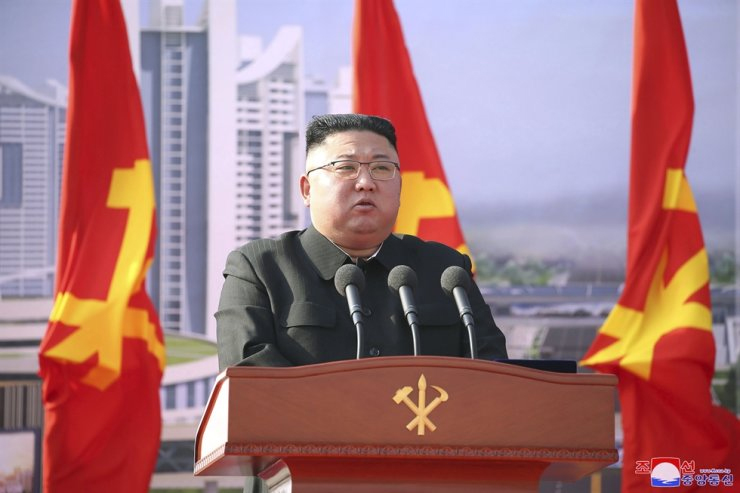North Korea is Testing American Patience with Latest Missile Test
America is enduring vulnerable times as fears of a fourth wave of infections from COVID-19 mount, and North Korea has aggravated this vulnerability by firing two missiles. This marks the country’s first missile test since President Joe Biden took office. Although the missiles fired were short-range, the tests could signal a longstanding threat as relations between the U.S. and North Korea become more combustible.
North Korea has ardently stood in favor of its nuclear program, despite President Trump’s attempts to get the country to denuclearize. However, with the new Biden administration, it is clear North Korean dictator Kim Jong Un has other plans in mind. The missiles were fired with three clear purposes: to demonstrate to the U.S. that North Korean nuclearization is inevitable, to the Biden administration to understand the North Korean nuclear program’s threat and to communicate to Americans that North Korea’s nuclear dominance cannot be stopped. Although the test-firing of these two short-range missiles resulted in no human casualties, the impact left on the American psyche should be a devastating one.
The Biden administration should be cognizant that it is no longer solely fighting two wars in defeating the pandemic and helping repair fractured race relations in a clearly divided country. Rather, Biden must understand that America, as well as our gradual rebuilding process, is being watched, and it may be only a matter of time until we are targeted. With North Korean missile tests resuming, it is clear that there are threats to our nation beyond the pandemic claiming more than half a million American lives or even the long and arduous process of reestablishing trust in American democracy after the unprecedented capitol riot which placed our own democratic distrust on display for the world to see. Perhaps even worse is the threat which potentially looms around our recovery process, for North Korean missile tests can reasonably signal a country mobilizing for war. The Biden administration must comprehend who may be involved in the war and how they can prevent it. Prevention should be key, as America is in no position to prepare for war. We are already struggling in the war against the pandemic, with a national race against the clock to get vaccinated before a crippling fourth wave of infections ensues.
However, prevention does not necessarily mean submission. Biden proved this when he recently launched missile strikes in Iran, warning the country not to act with impunity and to tread lightly on American relations. America caught a glimpse of the North Korean nuclear program as they launched their short-range missiles with success. However, on the heels of Biden’s missile strikes in Iran, now would be the appropriate time to respond not just with similar success but with American power. By launching an airstrike against North Korea, Biden can effectively respond to North Korea not through presently unnecessary human casualties but by demonstrating that North Korea is not the only country with a nuclear program to boast about.
The airstrike would display to North Korea national awareness that they have chosen to resume nuclear testing. Such awareness could not come at a better time as it is obvious to the world we are entangled in a recovery process that will span further than the Biden administration. Between the effects of the pandemic on the economy, race relations and rebuilding trust in American democracy, it can be easy to forget all eyes are on America during such taxing times. However, when approaching North Korea, it is important the new administration establishes an attitude of North Korea being able to look but never to touch. North Korea should be sure that the moment they do cross this line, the consequences will be swift. This must be part of America reestablishing international respect after four years of national disrespect in the Trump administration.
Relations between the U.S. and North Korea have been turbulent in the past, but with the revival of their nuclear program, it is clear our relationship with North Korea is like a landmine; one wrong step can trigger unfathomable devastation. The optimal way to navigate such a precarious relationship is through offensive caution. Now is our opportunity to make America heard much as North Korea did by launching a missile strike of our own to communicate our nation’s refusal to be intimidated, especially during a time of vulnerability. Once this is done, America should await North Korea’s response and respond in kind.
We must, however, be clear that nuclear warfare is not something we inherently wish to participate in, as we are focused on national and global rebuilding, not further destruction. By avoiding human casualties and large-scale demolition of North Korea, we can communicate a message of strength and awareness effectively, without conveying we are prepared for a war that has not yet come.
The COVID-19 pandemic is not America’s first moment of vulnerability, and it certainly will not be our last. However, with the world watching, we must not allow our national vulnerability to be mistaken for weakness, and the first step in preventing such a mistaken view would be to ensure North Korea’s missile test does not go unanswered.
For even when America is at its most vulnerable, history has proven it is those moments where America is at its strongest.
Noah Osborne, FCRH ’23, is a journalism major from Harlem, N.Y.










































































































































































































